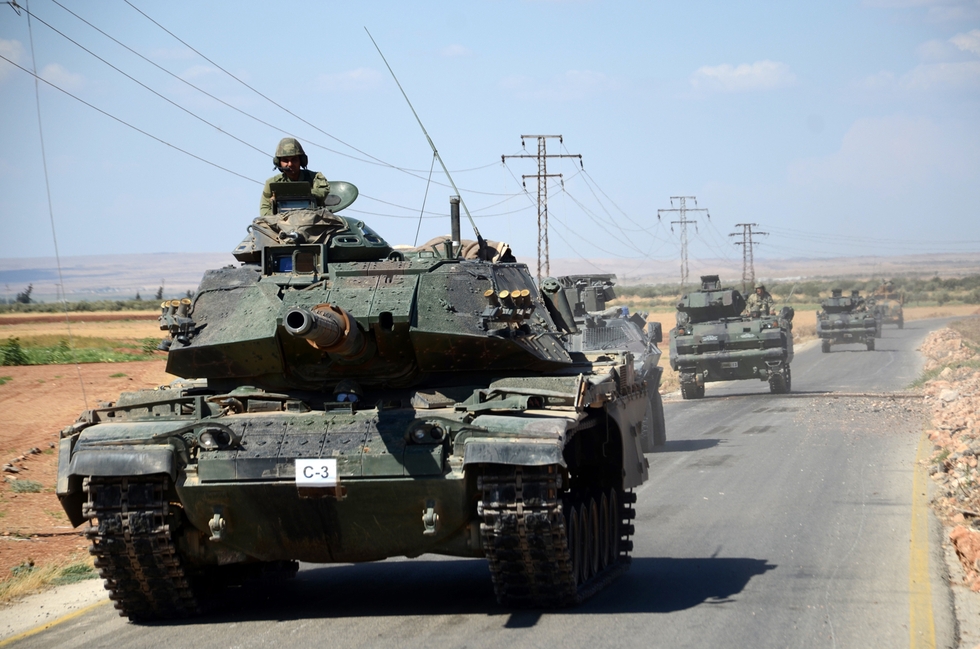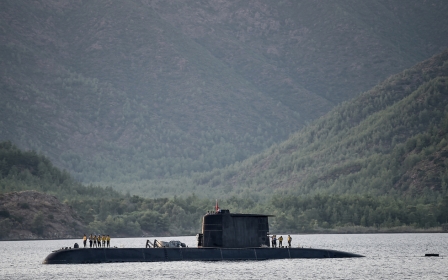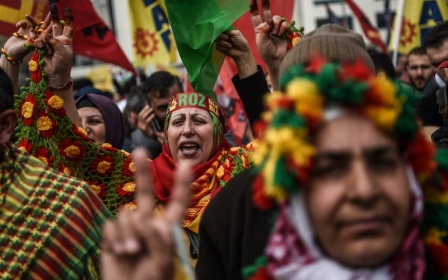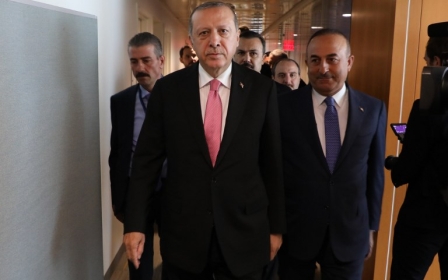Turkey to deploy troops inside Syria's Idlib: Erdogan

By Parisa Hafezi
Turkish President Recep Tayyip Erdogan said on Thursday Turkey will deploy troops in Syria's northern Idlib region as part of a so-called de-escalation agreement brokered by Russia last month.
The "de-escalation" zones, agreed by Turkey, Russia and Iran, will be further discussed in talks with Russian President Vladimir Putin during his trip to Ankara next week, Erdogan said in an interview with Reuters while he was in New York for the annual United Nations General Assembly.
"Under the agreement, Russians are maintaining security outside Idlib and Turkey will maintain the security inside the Idlib region," Erdogan said.
"The task is not easy ... With Putin we will discuss additional steps needed to be taken in order to eradicate terrorists once and for all to restore peace."
Erdogan also said Turkey was considering counter-measures, including imposing sanctions, against Kurdish northern Iraq over a planned referendum.
Under the agreement, Russians are maintaining security outside Idlib and Turkey will maintain the security inside Idlib region
- Recep Tayyip Erodgan, Turkish president
Iraqi Kurdish authorities have defied growing international pressure to call off the referendum on independence. Iraq’s neighbours fear it will fuel unrest among their own Kurdish populations and Western allies said it could detract from the fight against the Islamic State (IS) group.
Turkey has brought forward a cabinet meeting and national security council session to Friday over the referendum, Erdogan said. He said that parliament would also convene for an extraordinary meeting on Saturday.
"Without any further delay we are going to discuss what kind of sanctions should be imposed and when the sanctions will be imposed," he said without elaborating on what they might be.
Turkish troops are also carrying out military exercises near the border and Erdogan said on Saturday the resolution on troop deployment abroad will be submitted to parliament for a vote.
'Sheer lie'
Erdogan called on the United States to extradite US-based cleric Fethullah Gulen, whom Erdogan accuses of orchestrating a failed coup attempt in Turkey, in which rogue soldiers commandeered tanks and fighter jets, bombing parliament and trying to abduct or kill Erdogan.
Gulen denies any involvement in the July 2016 coup attempt, during which more than 240 people were killed.
"Gulen's entire network is being run from the United States. Terrorists should not be harboured here. We need US assistance on this matter," Erdogan said.
Since the failed coup, Turkish authorities have shut more than 130 media outlets, and a media union says more than 150 journalists have been jailed, raising concerns about freedom of information in Turkey.
Turkey has also suspended or dismissed more than 150,000 judges, teachers, police and civil servants and has arrested almost 50,000 others suspected of links to the Gulen movement.
The EU and human rights organisations have expressed concern over Turkey’s security crackdown since the failed coup.
Turkey says its crackdown is targeting supporters of Gulen.
"Let me be very clear, in terms of freedom of press, there are no challenges in Turkey ... If journalists are supporters of terrorists, if they are double-agents, are we not supposed to do what is necessary against them?" Erdogan said.
"Turkey is a state of law, within which the judiciary takes necessary measure ... This is sheer lie ... they were coup plotters."
'Strategic partners'
Meeting Erdogan on the sidelines of the UN General Assembly, President Donald Trump on Thursday praised his leadership and said he "has become a friend of mine".
Relations between Turkey and the United States were strained over Turkish security officials involved in street fighting with protesters during a visit to Washington in May.
Turkey is part of the US-led coalition against IS in Syria and Iraq, but Ankara's ties with Washington are also strained over support provided by the United States to the Syrian Kurdish militia YPG.
Viewed by Turkey as the Syrian extension of the outlawed Kurdistan Workers Party (PKK), the YPG has been among the most effective partners on the ground in the US-led fight against IS.
Erdogan warned Washington that arming the YPG could end up hurting Washington and its allies.
"Weapons are being deployed to YPG ... We are strategic allies with the United States ... we should avoid helping YPG," he said.
At a critical time for Turkish-Germany relations, Erdogan said in the interview he hoped relations with Germany could be improved, praising German Chancellor Angela Merkel for refraining from criticising Turkey and its policies.
Weapons are being deployed to YPG ... We are strategic allies with the United States ... we should avoid helping YPG
- Recep Tayyip Erodgan, Turkish president
"I am quite hopeful relations will improve ... We have no problem with the German public. We have a problem with some officials' wrong attitude against Turkey," he said.
Merkel, who has been at odds with Erdogan on many fronts over the last year, has said that "the fact is clear that Turkey should not become a member of the EU". Merkel has said she will speak to other European Union leaders to end Turkey's EU accession talks.
"Things never went well for the last 54 years regarding Turkey's EU membership ... We have been lingering at the doorstep of the EU and things have got worse. They have never kept their promises," Erdogan said.
New MEE newsletter: Jerusalem Dispatch
Sign up to get the latest insights and analysis on Israel-Palestine, alongside Turkey Unpacked and other MEE newsletters
Middle East Eye delivers independent and unrivalled coverage and analysis of the Middle East, North Africa and beyond. To learn more about republishing this content and the associated fees, please fill out this form. More about MEE can be found here.




